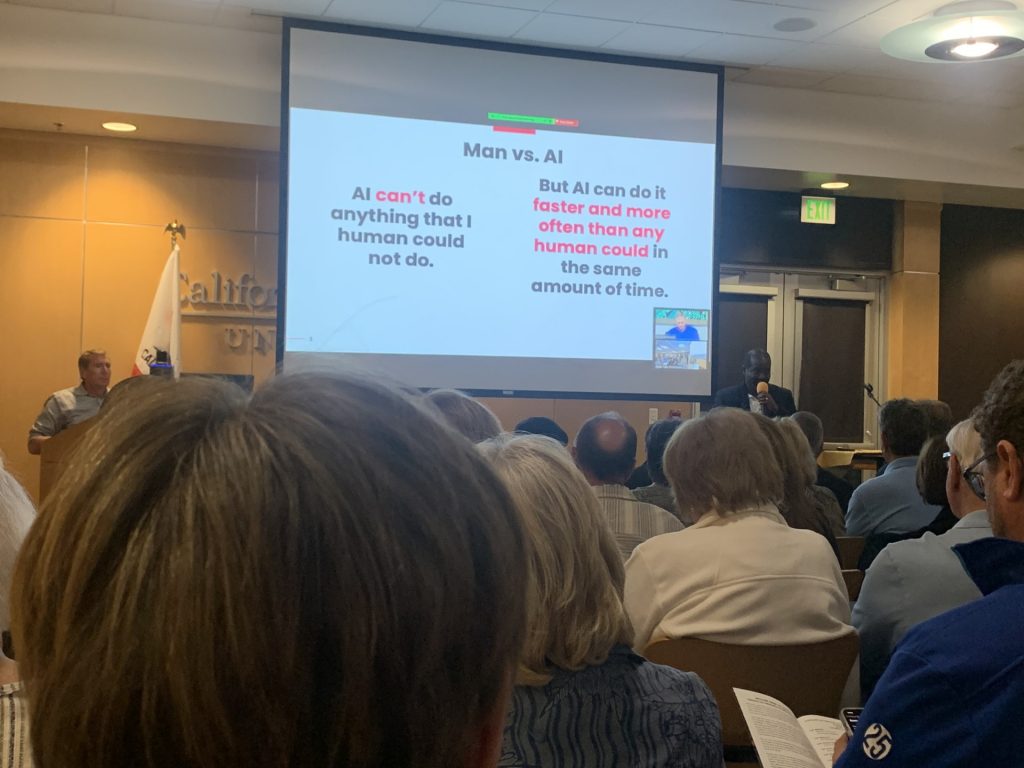CLU forum addresses AI challenges

Scott Klososky has no fear about Artificial Intelligence’s future impact on the human race.
The self-styled “digital philosopher” doesn’t buy fictional scenarios in movies and books that AI will eventually take over the world and extinguish people.
Humans should embrace AI for what it can do for them more than fear its possible negatives, Klososky said at a Nov. 14 forum at California Lutheran University in Thousand Oaks on the rapidly emerging technology.
“If we will amplify what it will do from a potential standpoint, while also managing the risks, then AI will be a tremendous blessing for humanity,” Klososky, founding partner of Oklahoma-based technology strategy firm Future Point of View, told the audience via Zoom.
He was one of ten speakers at the program, each speaking for ten minutes on ten wide-ranging AI topics.
Local musician Richard Belmond played a song on his guitar that he had created on the spot using ChatGPT.
Microsoft’s AI chatbot has taken the world by storm, launching in November 2022 and rapidly growing to more than 100 million users.
Following the forum, Belmond told the Business Times that he basically hated the song ChatGPT had spit out.
“I thought it was terrible to be honest with you,” Belmond, 72, said. “I did that kind of music when I was 16.”
He said AI-created music lacks “heart, soul, nuance, dynamics, all of that.”
Another speaker, Michael Cosenza, department chair and professor of education at CLU, addressed the ethics of AI in education.
The slides he used in his presentation, he noted, were created by ChatGPT.
At an education roundtable he had previously attended, a model of how AI-generated lesson plans for teachers was demonstrated, he said.
“And the people at the roundtable watched as ChatGPT spit out over a couple of minutes an entire lesson plan,” Cosenza said.
A teacher would need an hour or two to create the same lesson plan, he said.
“Some people at the roundtable had never seen ChatGPT and their mouths were open, their eyes were bugged out,” he said.
AI negatives in education include college students using the technology to create papers, but claiming them as their own, Cosenza said.
“This genie is out of the bottle,” he said.
Damon Young, managing director with intelligent technologies advisory firm Polywise Partners, spoke on AI’s practical uses.
“What was the top performing way to do your job today is going to be changed and accelerated in the weeks and months to come,” he said.
A slide he projected with the heading “Man vs. AI” said, “AI can’t do anything that I human could not do.
“But AI can do it faster and more often than any human could in the same amount of time,” the slide said.
Jonathan Pearce, a patent attorney with SoCal IP Group, a law firm with offices in Westlake Village and Santa Barbara, addressed AI and intellectual property. He cited specific examples of the current intersection of AI and the law.
They included a Columbian judge who used ChatGPT in deciding a case and another judge requiring lawyers to identify any AI-generated content in briefs.
AI is also being used to create first drafts of blogs and press releases, Pearce said.
Specific uses of AI in intellectual property will include patent and trademark drafting, while IP licenses may become more standardized and begin with AI-drafted forms, according to a slide Pearce projected. Other topics addressed at the forum were an introductory overview of AI, AI and biopharma, AI and law enforcement, AI in fuel moisture modeling and AI in medicine.
“The bottom line is that it’s going to be used in everything you do across the board,” he said. “There’s going to be a mix of AI suggesting things and you doing things.”
email: [email protected]









